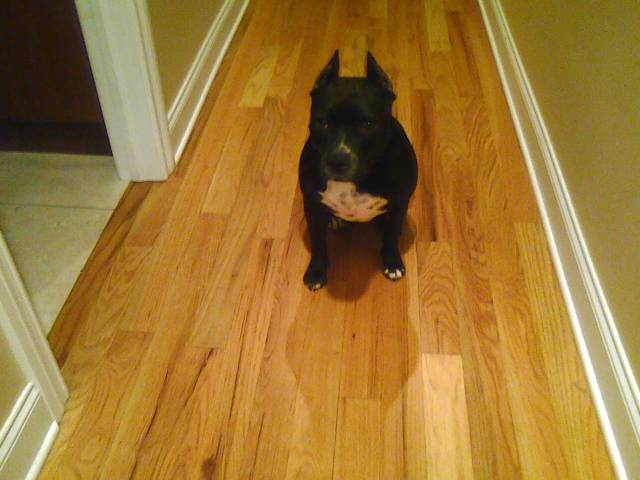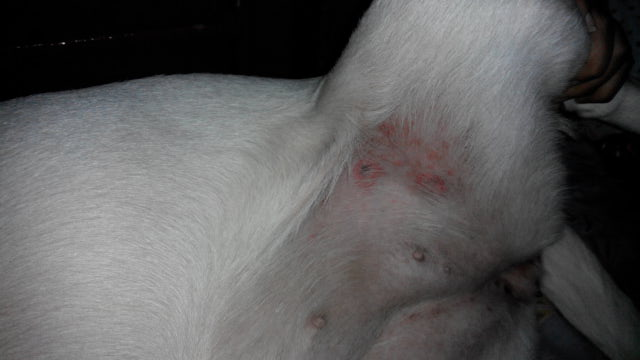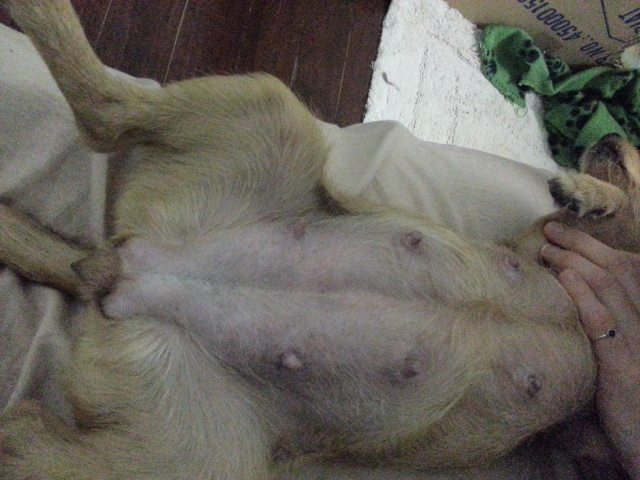QuestionMy 9-year old male cocker has had moles (approx 7 or 8) for the last couple of years. They are located under his neck, on his sides, and on top of his head and top of ears. They are pink and about the size of a small pea. They protrude out about 1/16 of an inch from the skin. He has not had any problems with them until I had him groomed last week. Now he is scratching them until they bleed and scab over and he still continues to scratch the ones he can get to. I have cleansed with peroxide and betadine, given benedryl, 25 mg, by mouth for itching. It is not helping. The moles do not seem to have grown in size or number. He has always been bothered with allergies but only gets frontline and heart worm medicine on a monthly basis. I live on social security and cannot pay great vet bills. But, this boy is my love, and I will do as much as I am possibly able. I called my vet who wanted to see him for an evaluation and then said she would probably need to schedule surgery with anesthesia to remove them. Please advise me. Thank you very much.
AnswerHi Deb,
Are you sure you're giving your dog the correct dose of Benedryl? The recommended dose for dogs is one milligram for every pound given twice daily. So, a 25 pound dog would get 25 milligrams, which is 1 adult capsule. You can try applying an over-the-counter hydrocortisone anti-itch cream to the areas, and prevent your dog from licking it. It's helpful to apply the cream just before you take your dog out for a walk, so it has time to sink in and work, and hopefully your dog will forget about it by the time you come back from the walk.
Another over the counter thing you could try is Domeboro Powder and water (mixed together this is called "Burow's Solution"). Burow's Solution will relieve inflammatory conditions of the skin, such as insect bites, swelling, allergies and bruises, and it works as an antibacterial to inhibit the growth of bacteria. Apply it with a compress or as a spray. Use cold or cool water, it won't aggrivate the itch like warm water can. You should be able to find Domeboro powder at a good pharmacy.
Try to prevent your dog from traumatizing the area even more. Give him a firm "NO!" when you see him start scratching. It might help if your dog wore an Elizabethan collar to prevent traumatizing the wounds. You can make one yourself, here are instructions:
http://www.lowchensaustralia.com/health/elizabethan.htm
If your dog continues to scratch at these areas, then you will need to take him to your vet. Broken skin can easily become infected, and that will make for a longer and more costly treatment. Talk to your vet about more conservative ways of treating your dog. Depending on what these growths are, your dog may just require is a prescribed anti-itch medication, and possibly an Elizabethan collar which would prevent the scratching, and give his skin has a chance to heal.
If you are having trouble affording veterinary care, first talk to your regular vet. Ask your veterinarian if he or she will let you work out a payment plan. Many veterinarians are willing to work out a weekly or monthly payment plan so that you do not have to pay the entire cost of veterinary care up front. If that doesn't work, contact your local shelter or Humane Society. Some shelters operate or know of local subsidized veterinary clinics or veterinary assistance programs. You could also check with veterinary schools in your state to see if they offer discount services to the public. You could ask your employer for an advance on your salary. If you happen to belong to a church or synagogue, they might have funds available to help members of their congregation in financial need.
When all else fails, you can apply for a special credit card that can be used for medical bills, including veterinary care. Read about this here:
Care Credit: http://www.carecredit.com
Citi Healthcard: http://www.healthcard.citicards.com
One more thing, you should always dilute Hydrogen Peroxide. Used full strength, it can damage healthy skin on the perimeter of the wounds. Warm soap and water and Betadine are all you need to keep the areas clean. It can be helpful to trim the hair around these growths, so they stay dry and have a good shot at healing.
I hope I've been a help.
Best of luck,
Patti

 AmStaff Terrier
QuestionMy dog
QUESTION: I have a 2 1/2 year old
AmStaff Terrier
QuestionMy dog
QUESTION: I have a 2 1/2 year old
 Live worms came out in my dogs poop and he has some rashes?
Question
The Rashes
She is 15 months old and is
Live worms came out in my dogs poop and he has some rashes?
Question
The Rashes
She is 15 months old and is
 Help with my best friend :)
Question
cash
Hello!
&
Help with my best friend :)
Question
cash
Hello!
&
 high temp tummy
Question
swollen nipples?
My two year old Jack R
high temp tummy
Question
swollen nipples?
My two year old Jack R
 New Eskimo puppy
Question
Honey the shy american
I just got my 10 week o
New Eskimo puppy
Question
Honey the shy american
I just got my 10 week o